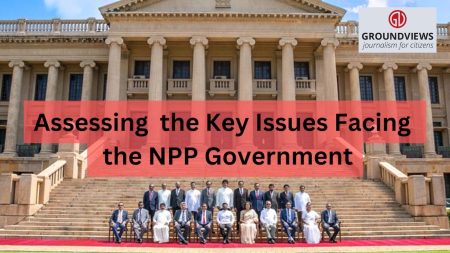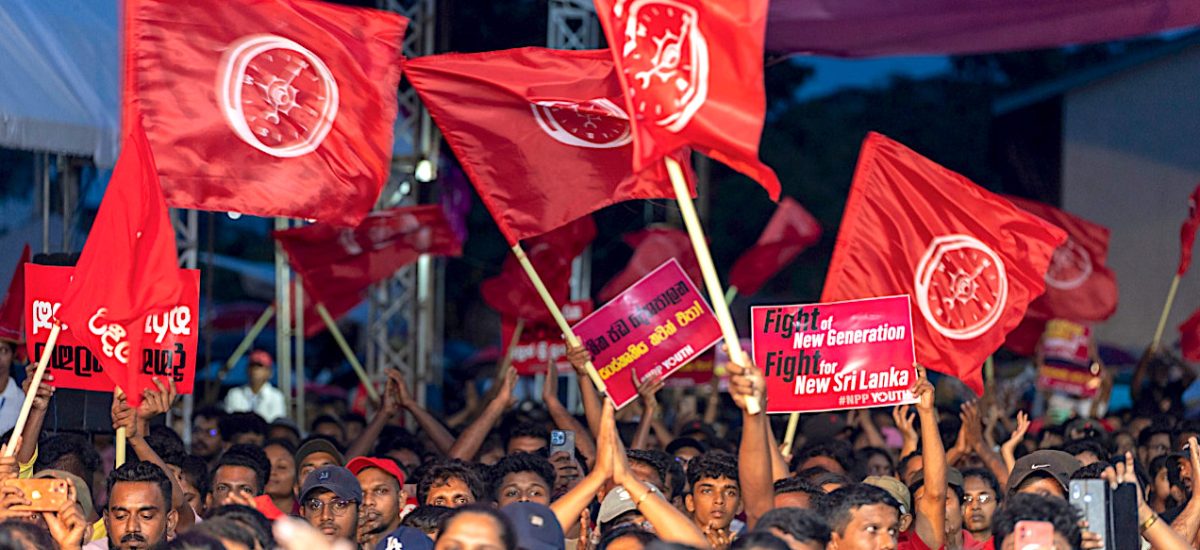Photo courtesy of NPP News
During their campaigns for the presidential and parliamentary elections, President Anura Kumara Dissanayake and his National People’s Power (NPP) party made several promises to voters on a wide range of issues including abolition of the executive presidency, repealing the Online Safety Act (OSA) and the Prevention of Terrorism Act (PTA), combatting corruption, moving forward on reconciliation and accountability and protecting the rights of women and the LGBTIQ+ community.
With its two thirds majority, the government is able to pass any legislation necessary to fulfil these promises but very little has actually been accomplished. The draconian laws remain in place, emblematic cases of murder and disappearances are not being pursued and homosexuality is still a crime. There is no progress on constitutional reform or moves to ensure the full implementation of the 13th amendment.
However, commitments have been made to create laws to address corruption such as the Proceeds of Crime Act and a taskforce has been appointed to combat money laundering and terrorism financing.
While the Clean Sri Lanka programme has been launched to address economic, social and governance issues, there is a lack of clarity on its specific mandate.
Among the easily accomplished undertaking are: an immediate moratorium and repeal of the Prevention of Terrorism Act and the Online Safety Act; establishment of an Office of Public Prosecution to provide a stronger mechanism for the administration of justice and development of trust in prosecution among victims and wider community; addressing emblematic cases; initiating confidence building measures such as land releases and releasing political prisoners; and reforming the law making process to ensure transparency and accountability.
Over the next several weeks Groundviews, in a series entitled Assessing the Key Issues Facing the NPP Government, will interview analysts and activists working on these issues to find out what should be done to ensure a peaceful, stable and inclusive society.
Executive Director of the Centre for Policy Alternatives, Dr Paikiasothy Saravanamuttu, spoke on the urgent need for abolishing the executive presidency, legislative reform and finding new paths for economic development.
With its two thirds majority in parliament the government can pass any legislation it wants but it is not doing so. Why do you think this is?
During the two election campaigns the candidates made a lot of promises. Some of them they did intentionally, knowing fully well they would not be able to fulfil them. The others they did because they lack the experience of being in government. Now they have come into government, they seem to be a bit lost in terms of how to do things rather than what to do and as a consequence they are behaving somewhat like an opposition party rather than a government. They are setting up commissions; they are looking here and there for advice and expertise and that is making them delay any action. It is three months now since the government was set up and there hasn’t been a single piece of legislation passed. The budget is all about welfare and giving subsidies. The real question the government has to face is where is the money coming from? Where is growth going to come from? That’s a question that I haven’t seen any satisfactory answer to. You can cut taxes, you can cut prices of electricity but you then end up with a shortfall in the budget. The other thing is the public service. We have a hugely bloated public service. They are not retrenching anyone; they are in fact talking about bringing in some 38,000 new public servants. The premise is that those who are there don’t have the capacities to do the job that is needed to be done, so we are going to have an increase in the public sector instead of a decrease. As far as reducing the public service and the armed forces you can’t just say go – you have to have a plan by which you retrench them.
What do you think the government’s immediate priorities should be?
If I was the government I would hit the road running in regard to the constitution because that’s the overarching law within which all other action should be taken – abolition of the executive presidency, full implementation of the 13th amendment, setting up of a second chamber, reconstituting the Constitutional Council whereby you don’t have a majority of politicians that was originally the idea, and reconstituting the office of the Attorney General’s department whereby you have a public prosecutor. Abolition of the executive presidency is absolutely pivotal because in terms of corruption. The president appoints the permanent secretaries to ministries who are the chief financial auditing officers of those ministries. If you can get the constitution through within a period of six months then you can proceed with everything else.
What about other issues such as repealing unfair acts?
These can be done overnight. You can repeal the PTA overnight. If they feel strongly that they need a replacement for that Act they should have those consultations with civil society and go ahead and bring out the new legislation. But in the meantime we said in Geneva that we will have a moratorium on the use of the PTA and we should hold to that. In regard to the OSA, that act is irredeemable and they should, as they said in the campaign, just get rid of it. They talk about the Act being done to look after women and children but there are only two places in which women and children are referred to. Are those laws implemented? That is the key question. Civil society should be pressuring the government and reminding them of their promises that they are now being somewhat ambiguous about. And keep up that pressure because they have 158 members of parliament and the opposition is in absolute disarray. Who is going to step in to fill the role? It has to be civil society.
There is a feeling that the economy should take priority and that the government should not be distracted from that. Is this a good excuse?
Economy should take priority in terms of the day to day challenges for people but to fix it from the grassroots upwards you need to have an architecture of governance that needs to facilitate where we want to go with this country. A budget for example is a budget for year. But the budget must be located within a financial strategy that will then proceed every year to take us closer to those goals. This is what we are lacking – a clearly ordained financial strategy with a clear plan of action. The government keeps saying that the bureaucracy doesn’t support it and that there is what is euphemistically referred to as a deep state but the majority of these people actually voted for the government so it is about the JVP telling the people who voted for them the truth. Civil society too should not jump on that bandwagon of whinging and whining and talking about how difficult it is for people to find three square meals a day. We should also be looking at where the money is going to come from.
What can civil society do to make sure these promises are kept?
Tell the truth. Tell the truth that government is bloated and that we have to get reduce the public service. Likewise with the military; how do we retrench them? There has to be a plan. We have state owned enterprises that are making losses of millions a day. The government has no right to be in business. Privatise them. If you can’t privatise them, then shut them up. At the end of the day, the government is nurturing a culture of entitlement on the part of the citizens of this country. The citizens of this country get free education and free health and they get a job in the public service where there are no key performance indicators. They are looked after for the rest of their lives from womb to tomb. How do you win votes? By promising 10,000 new jobs and by promising 10,000 more rupees for those who have the jobs. So it’s a handout of resources that we do not have. We rely on women plucking tea, women working in garment factories and women going out as migrant labour. This is the 21st century. We can’t rely on these three things permanently as the backbone of our economy. We need to diversify.
What will happen if the government fails to meet the expectations of the people in regard to the system change that the aragalaya was asking for?
If the government fails to meet the promises that it made, and I hope this will not happen, is that you will get the people coming out on the streets. The opposition to this government is from within the constituencies that brought it into power. So you have the Frontline Socialist Party and other elements who have already started criticising the government but who are largely within that JVP fold. Another aragalaya will make the previous one look like a tea party and could possibly be violent. And probably one of the reasons why they are keeping the PTA is so that they can use this legislation. I just hope I am wrong in regard to this.


